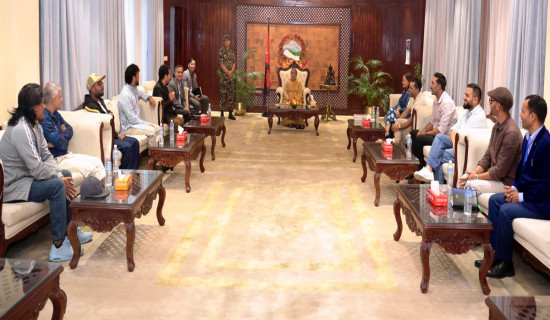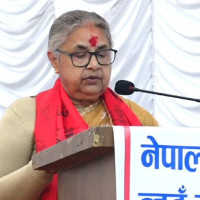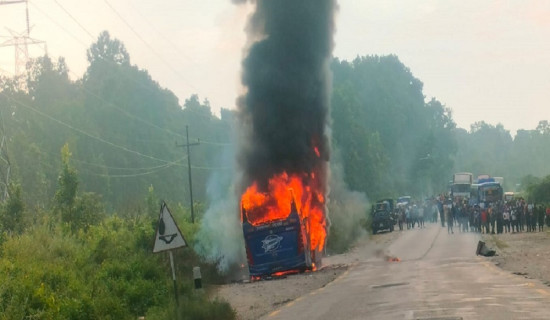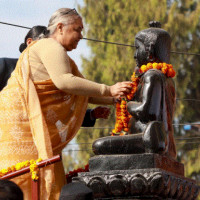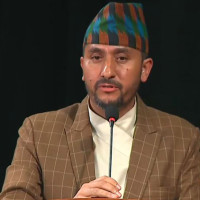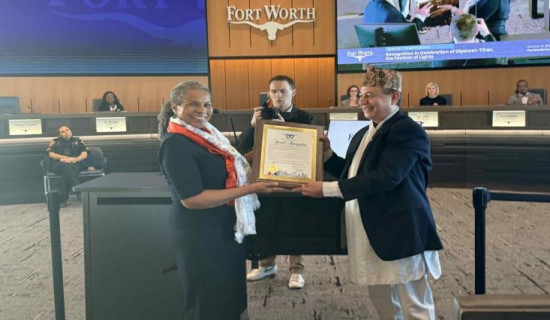- Thursday, 23 October 2025
Multipolar World Order Needs Coordination
The global balance of power is shifting from uni-polarity to a multi-polar order. In this order, all sovereign states seek their security and political and economic interests. At the moment, three great powers — the United States, China and Russia are in a race to rejuvenate their super-powerdom and seek to bridge their technology, power and wealth gaps to compete in land, sea and outer space for influence. This order is buttressed more by realism than by any commitment to democracy, human rights and market economy. Nations of diverse sizes, scales, and powers are adjusting to this new reality by devising multi-pronged policies.
The precise intellectual conceptualisation of this world order with well-defined goals is still incipient. All pursue cost-effective means to promote national interests. Neither can isolate and dominate the other. Building world order hence requires certain universal values, institutions and rules of cooperation of nations and peoples and their common stake in it. Realism matters for US President Donald Trump. He deals with adversaries for peace and profit to reshape the course of world politics. The US, anxious to make America great again, is pivoting its policy to Asia but is caught at odds with its allies—Canada, Mexico, Panama, Denmark and Europe over trade, tariffs and defense outlay. It is asserting its hegemony in Latin America.
Rise of nationalism
However, the rise of nationalism in Africa and Asia poses a special context. Asia’s share of the world’s population is 60 per cent, in GDP it is over 50 per cent and in world trade it stands at 57 percent. China, at the centre of its rising security, technological, economic and diplomatic heft, is a lynchpin of Easternisation. It balances its ties with the USA and Europe and evolving ties with Russia beyond limits while pursuing its global initiatives on civilization, security and development for a non-hegemonic world order with a vision of a “community of common destiny.”
China, Russia, Iran and North Korea have found a common reason to resist containment and ensure each other’s energy security, development and collective defense. The members of Global South did not join the Atlantic nations’ economic sanctions against Russia over its invasion of Ukraine for the latter's lure to join the expansion of NATO and EU though many of them voted against it in the UN. Israel too faced a similar situation. The American veto in the UN protected it. It is now gaining both economic and arms support. China and India remained neutral but advised Russia and Ukraine to resolve the war through negotiations. Both elevated their ties by purchasing the former’s oil and gas.
India and Turkey, members of QUAD and NATO respectively, bought the Russian air defense system SS-400. The cost of Western economic sanctions against Russia is mutually hurting. So do the reciprocal tariffs of the USA with other nations. The American interest in raising tariffs on allies and competitors is aimed at balancing the trade deficits, protecting and promoting its manufacturing sectors, and creating job opportunities. It resembles a policy of de-globalisation. The BRICS’s multilateral New Development Bank is seen as a counterweight to G7 having the Global South’s own sense of sovereignty in international relations. The China-backed Asian Infrastructure Investment Bank (AIIB) is even joined by 18 members of the European Union including Germany, France and Italy despite American opposition.
As an alternative to the World Bank and International Monetary Fund, it has enhanced Chinese leverage in the world. Many Asian, African and Latin American nations are rediscovering their own native values and defining identities, not styling them in the neo-liberal image of the West defined by the ideology of Washington Consensus and its version of rule-based global order. President Trump’s policy to align aid and diplomacy to American interests and collapse of USAID to root out a “deep state” spoiling the peace, security and prosperity of America and weak nations strikes a positive ring while infecting health and humanitarian conditions.
It may inspire the latter to look for alternatives or build collective self-reliance seeking a just global order. China’s growing leadership in innovation in artificial intelligence and green technologies such as electric cars, solar panels, wind turbines and batteries might serve as a bridge to the future of sustainable development. It is the second largest economy which offers new opportunities for many nations. With a standard education system, modernization, largest army personnel and hypersonic missiles, its influence and outreach is expected to grow in the years ahead.
The late start of Western powers’ infrastructure progress, health, energy, education and climate resilient programmes for the Asian, African and Latin American nations may not be able to divert their attention from China’s Belt and Road Initiative and link to the world. The Chinese are calmly engaging with many Sino-phobic nations such as Japan, India, Vietnam, the Philippines and Australia for better ties and alleviating their security concerns. India, with its Make India Great Again goal, has adopted a multi-alignment policy to reap benefits from America and Sino-Russian orbit and has shown interest in resuming air flight to China, got access to pilgrimage in Kailash-Mansarovar and patched up trade ties while keeping peace in the border.
Enhanced Sino-Indian ties can spawn positive payoffs for Nepal’s progress and fill the vacuum created by the freezing of MCC. India seems to perk up trade ties with the USA, brace defense and energy cooperation, invite partnerships in artificial intelligence and space and contain terrorism. Security cooperation between the two is tied by QUAD, Indo-Pacific strategy and American offer of F-35 fighter jets to counterbalance China.
The policy of multi-platform can offer scope for the nations of the Global South to fashion their own version of the political, economic and social system and increase outreach by diplomacy. The ASEAN nations find it more comfortable to adjust to China’s projects in infrastructure development, connectivity, technology, green energy, security and economic cooperation than being caught in US-China rivalry in Taiwan and the South China Sea, a loop of the Indian Ocean, Horn of Africa, the arc of the Gulf and the Pacific where trade and energy flow offers China grand promise. Many nations’ readiness to enter into de-dollarisation and start trade and transactions in their own currency might reduce the leverage of the US dollar.
Riled by this trend, President Trump has threatened to impose a 100 per cent tariff on them. The Russian-Iran defense accord has made Iran a key player in the Middle East whose networks of non-state armed actors are fighting a war of attrition with the US and Israeli forces. Even Turkey is at odds with the USA and Israel in the Syrian civil war and together with other Islamic nations opposes Trump’s policy to occupy the Gaza Strip and settle Palestinians in Jordan and Egypt. The triangular brawl among Iranian, Turkish and Israeli forces in Syria has made the regional geopolitics complex to resolve.
The European nations are caught under the pressure of US President Trump to boost their defense expenditure to 5 per cent of their national income and make NATO robust to face any threat and engage in fair trade with America. They fear the meeting between Trump and Vladimir Putin in Saudi Arabia over “restoring the entire range of US-Russia ties and the Ukrainian peace process without them and Kyiv and crippling Trans-Atlantic commitment to common security and democratic order. The European leaders’ meeting in Paris debated on how to deal with America and Russia. Europe knows Ukraine’s neutrality satisfies Russia’s security but fears Russia’s victory and defeat; even Ukraine’s territorial losses and Russian dream of restoring the past glory.
Ukrainian President Volodymyr Zelensky searching for his nation’s security guarantee in the peace process, however, says that Europe alone cannot guarantee this without America while the latter bargained for the exchange of rare earth elements for strategic aid which he refused. At the security conference in Munich, US Vice-President J. D. Vance said, “The biggest threat to Europe is not from Russia and China or any other nation but from within,” entailing Europe to reform and defend itself.
The UN is radically weakened. But the principle of multilateralism is taking a new turn with the channel of G20, BRICS, SCO and a host of regional arrangements on economy and diplomacy. The return of geopolitics marks a veneer of international anarchy. The US withdrawal from WHO, Paris Climate Accord, Human Rights Council and rethinking about UNESCO may woefully impose resource constraints to subsidise the UN’s sustainable development goals, crisis-responsive capacity and peacebuilding. Multilateral institutions, international laws and the architecture of global security are now enfeebled.
Global governance
So do other global organisations such as the WTO. They are frozen at a time when global governance is essential to peacefully regulate the lives of peoples and nations of middle and small sizes and avoid sides to ensure supply chain function. Navigating a secure future of the world entails either reforming the UN to enhance its efficacy and make it representative of all nations based on sovereign equality, or crafting new global institutions to achieve collective security, peace and progress as well as an ability to govern the global common.
The stability of a multi-polar world order needs the collective will of three superpowers and their matching responsibilities to address global problems and resolve wars by peaceful means. Their effective nuclear deterrence and their pledge are vital to begin strategic arms limitation talk and avert the proliferation of nuclear weapons and arms race whose costs are colossal for ecological, development and peace dividends for people at risk.
It is positively harder to achieve as varied powers require norm-based coordination of policies so that even weaker nations are not forced to choose their sphere of influence. They need to assume leadership responsibilities in global affairs and create international institutions for the governance of global commons including the management of security, livelihoods, pandemics, climate change, migration and peaceful mitigation of wars essential to restore national and human dignity.
(Former Reader at the Department of Political Science, TU, Dahal writes on political and social issues.)



